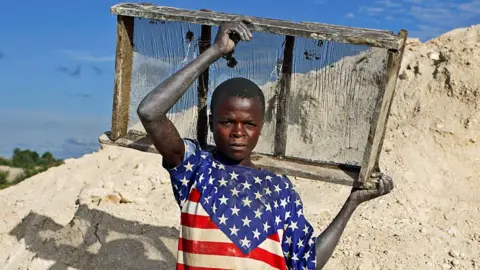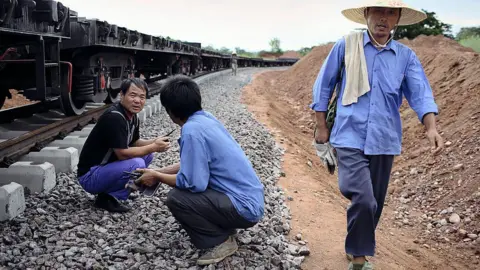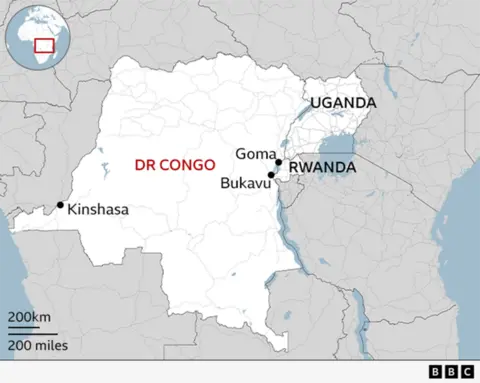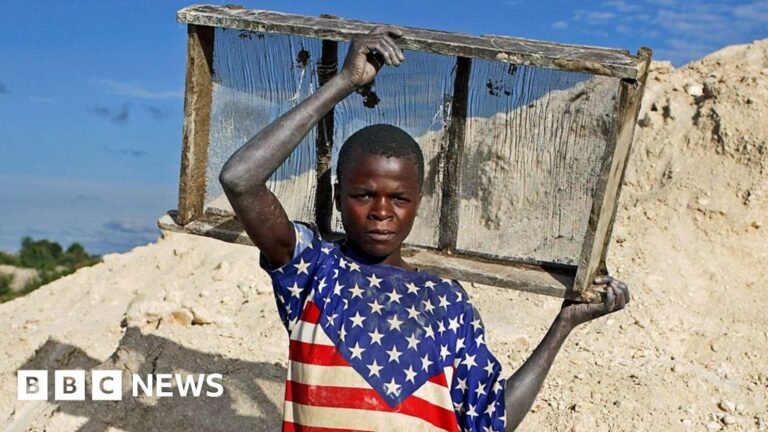 Getty Images
Getty ImagesThe Trump administration is spearheading an ambitious, but controversial, peace initiative aimed at ending the long-running conflict in eastern Democratic Republic of Congo that has also drawn in neighbouring Rwanda.
Its mediation efforts come as no surprise, as DR Congo – a nation in the heart of Africa – is endowed with the mineral wealth that the US requires to power the IT, and now AI, revolutions, much of which is currently going to China.
US President Donald Trump is expected to host the leaders of DR Congo and Rwanda – Félix Tshisekedi and Paul Kagame – in the coming weeks to seal a peace agreement that he has hailed as a “glorious triumph”, hoping to back it up with deals that will boost US investment in the region.
US-based World Peace Foundation executive director Prof Alex de Waal told the BBC that the Trump administration was promoting “a new model of peace-making, combining a populist performance with commercial deal-making”.
“Trump has done this in Ukraine also. He wants to get the glory to boost his own political standing, and to secure minerals that are in America’s interests,” Prof De Waal said.
However, he noted that “in DR Congo, China has already snapped up many of the minerals so the US is playing catch-up”.
He said that up to now US companies had been cautious about investing in DR Congo because of safety concerns and the “moral hazard” of dealing in so-called “blood minerals” – minerals financing rebellions – but this could change as the Trump administration implemented its peace model.
Prof De Waal said this could also happen in other conflict-hit states like Sudan, where the Trump administration – along with Arab nations such as Saudi Arabia, the United Arab Emirates and Egypt – was expected to get involved in mediation efforts after previous initiatives failed.
He added that the Trump administration’s peace model could not be dismissed out of hand, especially if it stops fighting that has killed thousands of people and displaced millions of others in conflicts that have raged for more than 30 years in eastern DR Congo.
“Trump can get the different sides to talk, and shake things up,” Prof De Waal said.
But Prof Hanri Mostert, an academic on mineral law at the University of Cape Town, South Africa, told the BBC that DR Congo “risked compromising sovereignty over its minerals”.
DR Congo could find itself locked into deals for years, in exchange for vague guarantees of security, she said.
This was reminiscent of the “resource-bartering” deals pursued by China and Russia in numerous African states, Prof Mostert added.
She cited as an example Angola, where China built infrastructure in exchange for oil.
“Even when oil prices went up, Angola couldn’t get more value for it,” Prof Mostert said.
 Getty Images
Getty ImagesThe US State Department said in 2023 that DR Congo had an estimated $25trn (£21.2trn) in mineral reserves.
This included cobalt, copper, lithium, manganese and tantalum – needed to make the electronic components used in computers, electric vehicles, mobile phones, wind turbines and military hardware.
“For how long will DR Congo have to give its cobalt to US investors? Will it be 20 years or 50 years? What is the price for peace?” Prof Mostert asked.
DR Congo government spokesman Patrick Muyaya confirmed to the BBC’s Newsday programme in March that his country wanted to supply the US with “some critical minerals” in exchange for a security deal.
The M23 rebel group launched a major offensive early this year, seizing huge areas of eastern DR Congo and smuggling minerals across the border to Rwanda, UN experts said in a report earlier this month.
The minerals were then mixed with Rwandan production, and “their subsequent export to downstream actors reached unprecedented levels”, the UN experts added.
Rwanda denies accusations that it backs the M23, even though the UN has provided evidence it has thousands of soldiers in DR Congo.
In what appears to be an attempt to address the issue of mineral smuggling, the US-brokered peace deal between DR Congo and Rwanda provides for a still-to-be negotiated “regional economic integration framework” between the two rival states.
This would “ensure illicit economic pathways are blocked” and “mutually beneficial partnerships and investment opportunities” created for “greater prosperity – especially for the region’s population”.
“We’re getting, for the United States, a lot of the mineral rights from the Congo as part of it,” Trump said, ahead of the peace deal signed by representatives of the two governments on 27 June in Washington.
A DR Congo researcher with the South Africa-based Institute for Security Studies think-tank, Bram Verelst, told the BBC that the US initiative was running in tandem with another one being led by Qatar, a close US ally.
Mr Verelst said the US’s focus was mainly on the regional dimension, while Qatar’s was on domestic issues between DR Congo’s government and the M23 rebel group that has set up its own administration in the east after capturing the regional capital, Goma.
Prof Jason Stearns, a Canada-based political scientist who specialises in the region, told the BBC that Qatar, like other oil-rich Gulf states, was expanding into Africa “to project power, influence, but also to seek economic opportunities”.
He added that it became involved in mediation efforts at the request of Rwanda, which perceived the US as being in favour of DR Congo, something Washington denies.
Prof Stearns said Qatar had “massive” economic interests in Rwanda, pointing out that the Gulf state was building a new multi-billion dollar airport in Kigali and was in talks to acquire a 49% stake in the national airline.
He explained that the US and Qatar were working closely together, but it was less than ideal to have two processes because “you don’t want to end up in a situation where there is a peace deal between DR Congo and Rwanda, but Rwanda then says: ‘We don’t control the M23’, and the M23 continues escalating [the conflict] in eastern DR Congo”.
“So it’s very important that the two processes are tightly tied to each other since the actors are so closely linked,” Prof Stearns added.

Under the peace deal, DR Congo and Rwanda agreed to launch a “security co-ordination mechanism” within 30 days of the 27 June deal.
Mr Verelst said that a ceasefire was expected to take effect on Tuesday, followed by the DR Congo government and the M23 signing a comprehensive peace agreement by 18 August, building on the “declaration of principles” they had already negotiated.
DR Congo-based International Crisis Group (ICG) think-tank analyst Onesphore Sematumba said the US and Qatar were getting deals struck in “record time” since Trump’s rise to the US presidency in January.
Mr Sematumba said their intervention came after various Africa-led mediation efforts had “failed to get the parties to sign even a single document” since 2022.
“Regional players do not have the same leverage to influence Kigali and Kinshasa,” he added.
“But between the signing of an agreement and the achievement of peace, the road can be long, and it will be long in this case,” Mr Sematumba warned.
One key question is whether the M23 will give up the territory under its control, as demanded by Tshisekedi’s government.
Mr Sematumba said the M23 had agreed to “state authority” being established across DR Congo, however, the rebels have also said they would not give up a “single centimetre” of land.
“Personally, I think the transition should be gradual, and for certain areas there should be some kind of co-management. But everything will depend on the tact of the mediators, and their ability to break the ice,” Mr Sematumba added.
He said the success of the peace initiative also hinged on what the agreement called the “lifting of defensive measures” by Rwanda, widely interpreted to mean the withdrawal of its troops from eastern DR Congo.
While Rwanda denies backing the M23, it says it wants to wipe out the FDLR, a militia born from those who carried out the 1994 genocide in Rwanda and then fled into DR Congo. Rwanda has accused the Congolese army of working with the FDLR.
The peace deal spells out that the FDLR should be “neutralised”, however this has been attempted several times over the past three decades.
“For Rwanda, the neutralisation of the FDLR is a precondition for the withdrawal of its forces, while DR Congo says the two must be achieved simultaneously,” Mr Sematumba pointed out, saying that mediators would have to find a solution as these issues had led to the failure of previous peace initiatives.
“Just by following the different interpretations given by the parties to the texts signed, you can sense all the difficulties that lie ahead,” Mr Sematumba said.
Prof Mostert agreed that diplomacy on its own could not achieve peace, and a broader initiative was needed.
“You build peace by transforming pain. That takes more than diplomacy. It takes dialogue, decentralised participation and dignifying people’s experiences,” she said.
“That’s why I believe it is important that the dealmakers and the lawmakers remain aware of historical traumas, including decades of resource exploitation,” Prof Mostert added.
So if he wants the peace to hold for long enough for US companies to profit, Donald Trump may have to keep the pressure on for some time to come.
 Getty Images/BBC
Getty Images/BBC

